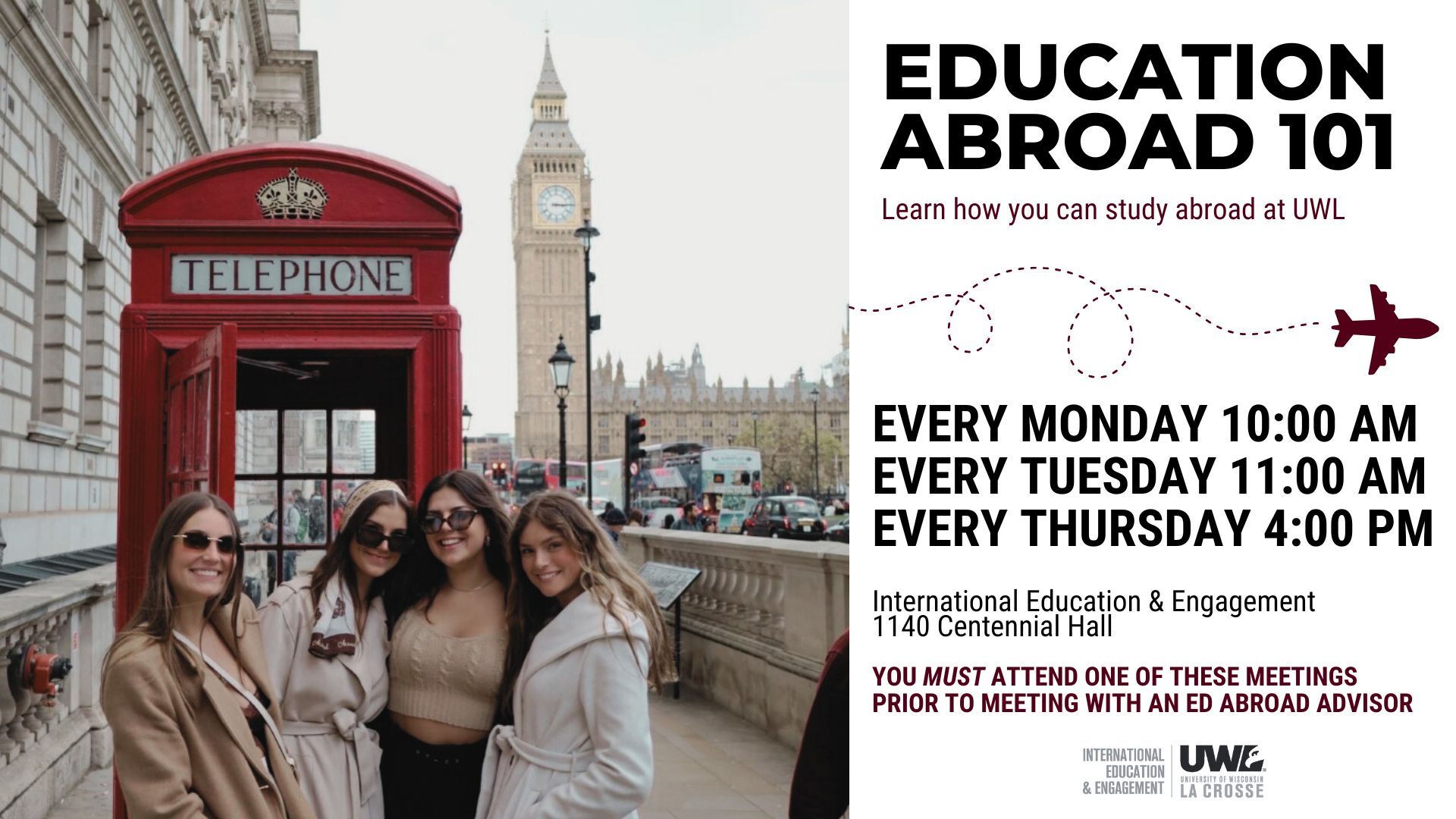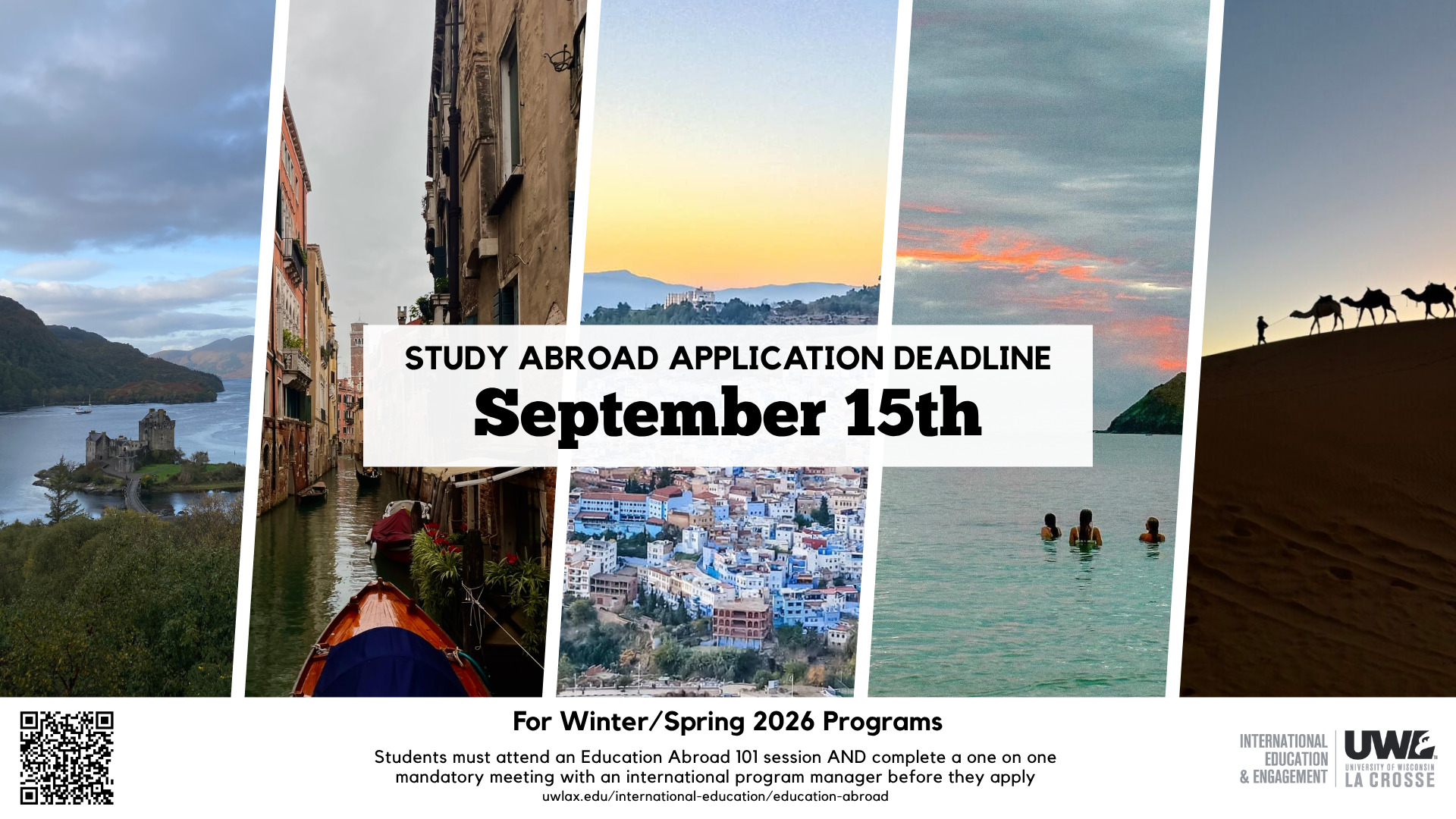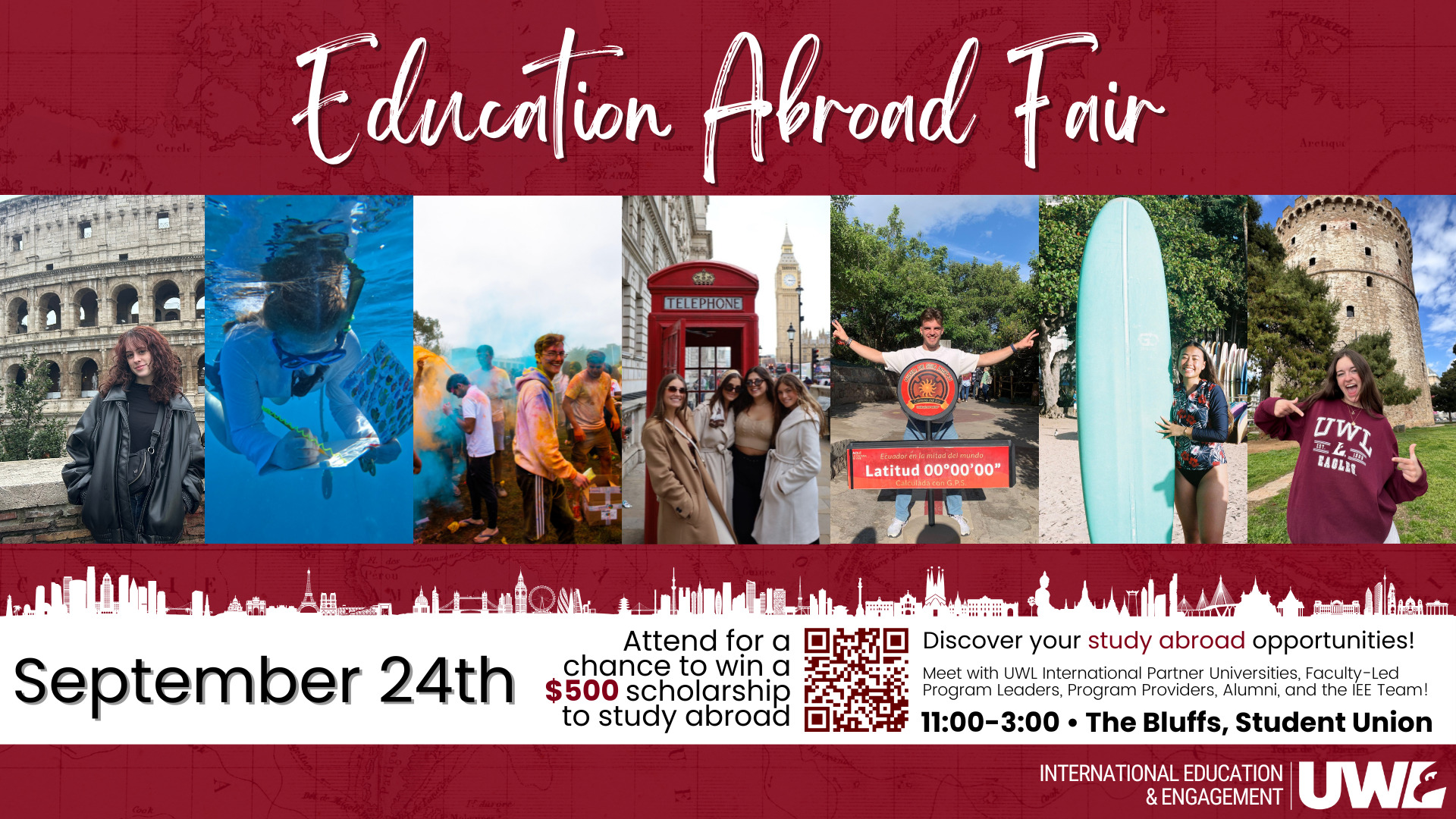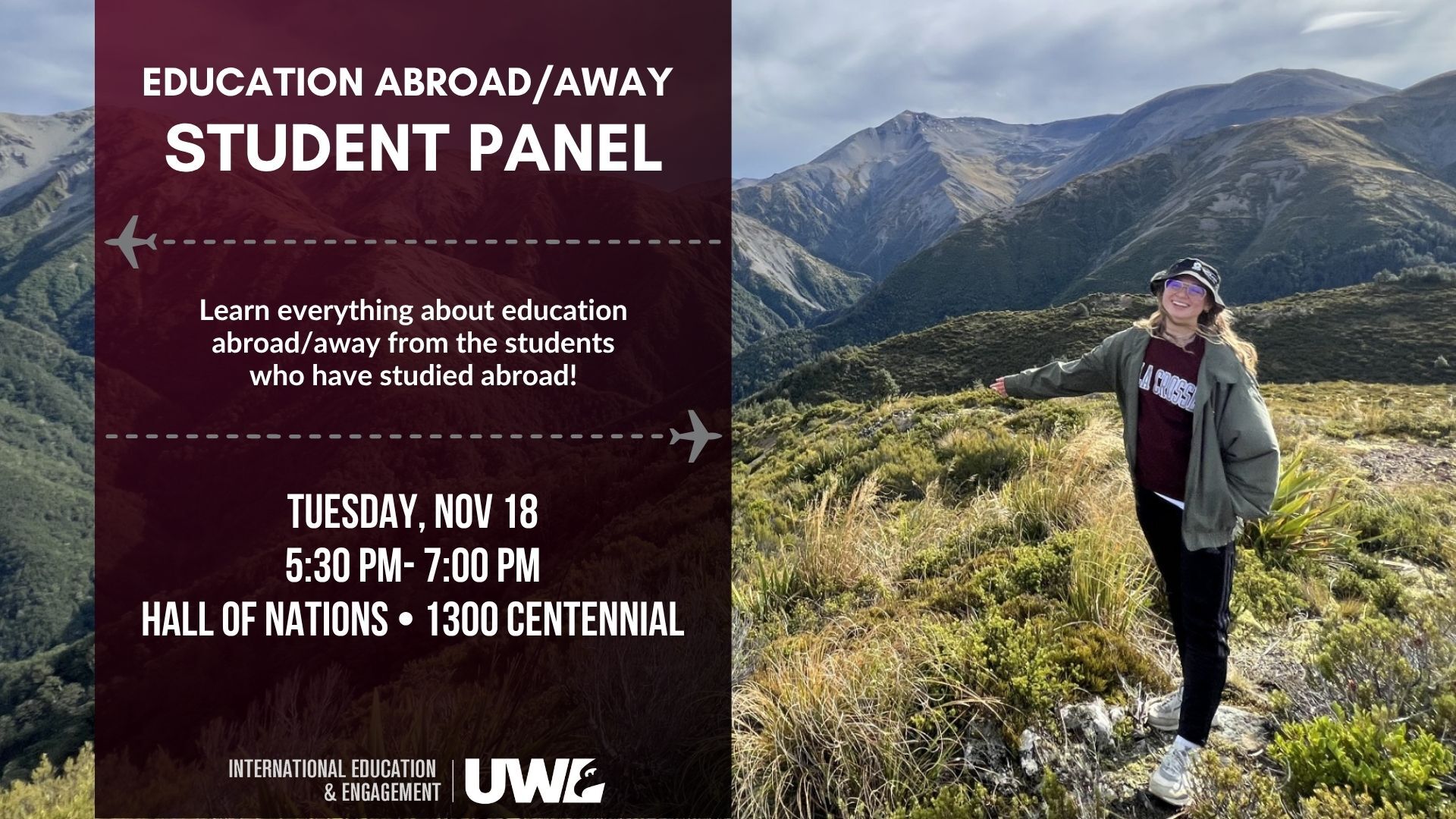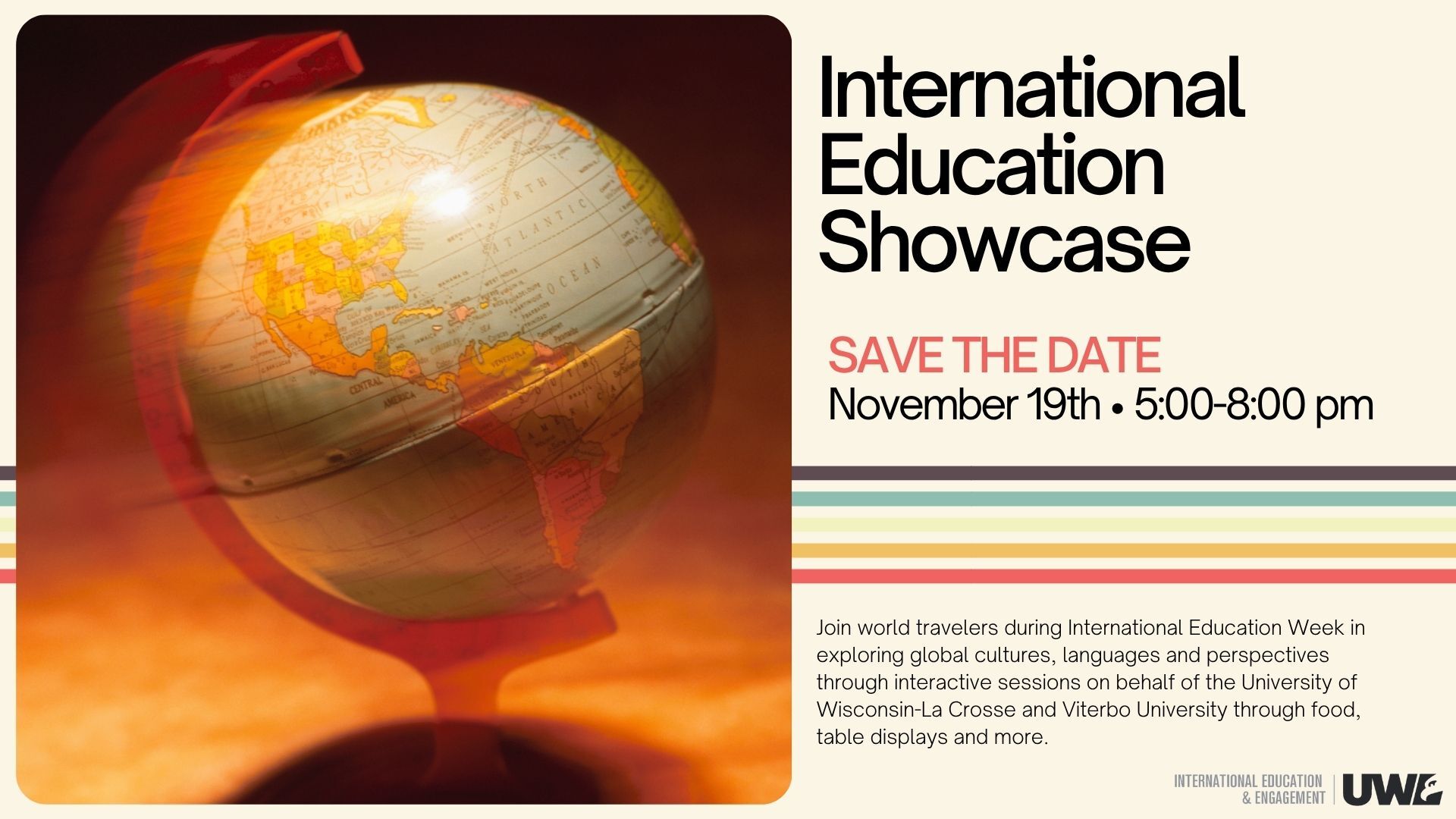Developing partnerships
A page within International Education & Engagement
Phases - intl agreements
Phase 1: Explore
Phase 2: Develop
Phase 3: Finalize
With the goal of internationalizing UWL’s comprehensive range of activities in education, research, and outreach, International Education & Engagement partners with academic units to develop and manage a wide array of international partnerships, from general Memoranda of Understanding to more specific joint efforts, such as student exchange agreements and collaborative degree programs.
For detailed information regarding the policies and practices associated with collaborative agreements, please review the following guidelines for developing effective new or revised partnership agreements:
Expanding boxes
Phase 1: Explore
Phase 1: Explore
- The agreement initiator should consult with their supervisor about the proposed partnership before any formal negotiations take place with the proposed partner. Items to be considered when evaluating proposal development. – link to below (Questions to Consider in Developing an MOU or Agreement).
- NOTE: Any programs involved in School of Education and/or K-12 teacher preparation must discuss licensure and state policy implications that may need to be considered before moving forward.
- The proposal should then follow the IEE approval process, which should culminate in approval by the Dean or designated proxy and Director of International Education and Engagement.
- The Dean or designated proxy (agreement initiator) should submit the proposed partnership for university approval using the agreement proposal form. Submissions will only be accepted from Dean’s offices.
- The proposal will be evaluated by IEE, Provost, Contracts Administrator, Vice Chancellor of Administration & Finance, and other campus partners for security, privacy, legal compliance, academic requirements, intellectual property requirements, and immigration requirements. It may take up to 3 weeks.
Phase 2: Develop
Phase 2: Develop
- With approval secured, the agreement initiator may begin negotiations with the proposed partner on a formal agreement. Agreement templates are available through UWL IEE and provided upon approval of the proposal. This may take several weeks or months to complete.
- Once an agreement document has been drafted between the two parties, the Dean should approve the document and forward the agreement to international@uwlax.edu.
- The agreement document will be evaluated for security, privacy, legal compliance, academic requirements, intellectual property requirements and immigration requirements. Additionally it allows UWL IEE to identify opportunities for collaboration and network building.
- If the agreement document is approved, it will be automatically forwarded to the Provost (or relevant university authority) for signature. Allow 1-2 weeks for review.
- Note: A separate financial addendum may be requested with new and non- standard agreements. Please consult with UWL Director of International Education & Engagement.
Phase 3: Finalize
Phase 3: Finalize
- The Provost and Vice Chancellor of Administration & Finance (or relevant university authority) will sign the agreement. Agreements are only considered valid UW-La Crosse agreements when signed at the university level through this process.
- Copies of the signed agreement will be sent to the initiator, Dean’s Office, and IEE.
- Once the fully executed copy is received from the partner, the agreement will be archived by Business Services and IEE with a copy to the College Dean’s Offices.
- Note: Contract development and approval may take several months, depending on the curriculum sequencing and review and transfer of the international credits. Once the finalized draft is prepared, it is sent to the host institution for review and approval before obtaining signatures. The institution's organizational structure, academic calendar, country holidays, etc., may extend the timeline.
Types of International Agreements
The following information, procedures, and forms should be referenced when developing a Memorandum of Understanding, Contract, or Addendum. The Provost, Director of International Education and Engagement, and Dean of the academic unit must all be consulted before any initiation of discussions about MOUs with potential partners.
Memorandum of Understanding (MOU)
An MOU is an initial agreement that establishes a relationship between UWL and a potential partner university. This document does not detail specific curriculum or budget information. Rather, it opens a dialogue for future negotiations. An MOU may be created in conjunction with the development of a Contract or Addendum. The process is relatively simple to complete and approve within a short period of time (1 - 2 months).
Addendum Program Agreement
An Addendum establishes the specific programming relationship between UWL and an established partner university. This document details specific curriculum and budget information and may be created in conjunction with the development of an MOU or Contract. There may be multiple addenda for a single contract, depending on the partnerships or programs developed.
All documents, including curriculum and budget forms, must have approval before submission for signatures. The development and approval process may take 6 - 9 months or longer for completion. (dual degree programs, research cooperations, faculty-led, faculty/student exchanges, etc.)
Dual Degree Agreements
This document structures the program through which students receive two existing degrees, one from each partner institution. Each institution is primarily responsible for its degree; however, an articulation of courses and procedures to ensure program quality and coordination is required. This agreement allows for credit transfer according to existing undergraduate and graduate policies. (2+2 or 3+2 programs)
|
BASIS FOR COMPARISON |
ADDENDUM AGREEMENT |
MOU |
|
Meaning |
Two or more parties agree to work together on a project with clear and defined expectations including dual degree programs, research cooperation, etc. |
Two or more parties agree to explore partnerships (academic, research, etc.) with mutual intent. An MOU documents an intended relationship. |
|
Elements |
Offer, Acceptance |
Offer, Intention and Consideration |
|
Enforceability |
Enforceable in court of law. |
Not enforceable in the court of law. |
|
Binding Nature |
Binds parties together through the agreement including academic articulation, responsible partners, financials, etc. |
Binds parties together although it does not involve financial agreements. |
|
Collateral Rights |
Yes |
No |
Partnership Considerations
- Academic rigor of the proposed institution
- Are academic standards comparable with UW-La Crosse?
- Do faculty and programs enjoy a well-known reputation for excellence?
- Does the partnership have the potential to advance UW-La Crosse’s research endeavors?
- What is the institution’s strategic plan? How does it fit with UW-La Crosse’s?
- Is the partner’s mission compatible with UWL?
- Existing successful programs
- Does UW-La Crosse already have programs and initiatives in place that would benefit from a partnership with those at the proposed university?
- Is there a faculty connection already established with the proposed partner?
- What are the initial projects that require an MOU/agreement and will launch the partnership?
- Partnership sustainability
- Is there a significant student/staff/faculty interest in engagement with this institution?
- Is this partnership viable in the light of the current political climate/world events?
- Do both academic calendars allow for traditional and non-traditional interaction/mobility between faculty and students?
- What are the anticipated outcomes of a partnership? How will its effectiveness be measured?
- What are the first activities for this partnership that build understanding at lower cost and risk?
- Overlap with existing partnerships:
- Does the proposed partnership compete with similar partnerships for students and faculty?
- Does the proposed partnership address a gap in existing partnerships?
- How does the proposed partnership leverage existing partnerships or institutional strengths?
- Partner institutional capacity:
- Does the partner’s curriculum match UWL’s needs?
- Is the partner’s academic calendar compatible with UWL? If not, is the proposed partner willing to work with UW-La Crosse on an individual basis?
- What is the language of instruction? Is there language support?
- Does the partner have an established administrative office to facilitate the agreement?
- Are there significant safety concerns?
- Is the planned activity legal for both partners to undertake?
- Are there any export control compliance concerns, including but not limited to the involvement of restricted parties and/or the need for an export control license?
- Resources:
- Will the department, college, or other participating party commit resources to the agreement?
- What resources is the partner offering?
- What external sources of support are available?
- What are the cost advantages of developing this partnership?
- Which of the following are available for support of this partnership: Faculty release time; travel for site visits; accommodations for visiting scholars; aid for study abroad students, special projects, or collaborations?
- Outcomes and expected level of activity:
- What are the first activities for this partnership that build understanding at lower cost and risk?
- What is a reasonable level of activity for this fully developed partnership?
- Does the relationship demonstrate potential for multiple interdisciplinary activities in the future, particularly engaging more than one UW-La Crosse unit or department?
- Institutional monitoring:
- Who is the UWL faculty/staff member willing to sponsor the partnership agreement?
- What is the term for review of the agreement?
- What are the activity-based metrics that will be used to evaluate this partnership?
For more information, please contact International Education & Engagement at international@uwlax.edu.
Developing partnerships
Cultural Considerations
Every country has its own etiquette and customs for meetings and general interactions. No matter what culture, you should be researching the basics of business etiquette and cultural difference to avoid offending potential partners. Don't be afraid to seek advice from others with travel experience and/or IEE staff.
Etiquette to consider and research:
- proper use of names and titles
- lateness/punctuality
- handshaking/greetings
- meals & dining
- business card handling
- personal space
- meeting protocol
- gifts
Different Concepts of Time
- Be patient, most cultures have a slower pace of business than the US
- Be aware of direct and casual business styles. Personal relationships may be of more value than is customary in the US. Many cultures will indulge in small talk before engaging in business.
- Take time to develop personal relationships.
- Explore the attitudes towards punctuality. Japanese and Germans are traditionally very punctual, whereas people in many Latin and African countries have a more relaxed approach to time.
Additional Resources
Partnership Networking Best Practices - Beyond the Classroom
Community engagement can lead to meaningful outcomes for our partners and an excellent real-world experience for our students and future graduates. As a representative of UWL who is developing a relationship with a community member, consider these best practices to help provide a positive experience.
- Getting the Conversation Started!
- Professional Communication
- Communicating Effectively with Technology
- Dressing the Part
- Punctuality
- Exceeding the Minimum
- Memorable Collaborations & Partnerships
Check out the UWL Community Engagement page for more tips and ideas.
Bringing the world to UW-La Crosse and extending UWL’s presence worldwide are critical to our promotion of global citizenship and awareness.
UWL welcomes visitors to our campus, especially from our partner institutions and foreign governments. These visits can enlighten and strengthen our teaching, research, and student engagement.
The University of Wisconsin-La Crosse values its partnerships with higher education institutions worldwide. Building and sustaining these international linkages is critical to our vision of becoming a leading global university. Therefore, international visitors to our campus must be well received and afforded culturally relevant courtesies and considerations.
This guidance is not intended to be definitive. Rather, it highlights a few important considerations that will enhance the quality and success of international visits. In preparing for international visitors, do not hesitate to refer to the many online resources on international protocol and other information related to hosting international visitors. Some useful links are included below. Also, if you have specific questions or require assistance preparing for a visit, please contact UWL International Education & Engagement.
Single Point of Contact for International Visitors
- Hosting departments and colleges will coordinate arrangements. UWL International Education & Engagement will support and assist colleges and departments as requested with other international visitors
Accommodations
- Recommendations and guidance should be given to accommodation for international visitors. While in most instances, local hotels within walking distance of the university will be adequate, factors such as the position/status of the visitor(s), duration, and special accommodations.
Transportation
- If possible, meet visiting delegations at the airport. Also, make plans to escort visitors to all meetings and events and to provide them with transportation for the duration of their visit. This is particularly important if UWL has received such treatment in the visitor’s country.
Scheduling Considerations
- Always prepare a detailed itinerary that minimally includes names, titles, and arrival and departure information of visitor (s); names and titles of UWL officials to be seen; date, time, location of meeting or event; responsible UWL party and contact information. Do not over-program guest(s) and if jet lag is a factor, build in downtime.
Greetings & Introductions
- Always err on the side of formality when introducing guests. Titles and positions often carry more prestige in other cultures than they do in the U.S. Try to review the cultural practices relative to handshakes, bowing, etc. before the guests arrive. Always be prepared with an adequate supply of business cards to exchange with guests.
Gifts
- It is appropriate to exchange gifts with visiting international delegations, and UWL should expect that official international delegations will arrive on campus bearing gifts. International visitors typically present high-quality gifts, and this should be kept in mind in selecting gifts for our guests. The hosting unit is responsible for acquiring appropriate gifts and coordinating presentation arrangements.
Signing Ceremonies
- Ceremonies involving the signing of agreements or special presentations should always be conducted with an air of formality. Gifts can be exchanged either at the beginning or end of the ceremony. Consider displaying flags, floral arrangements, memorabilia of the country in UWL possession etc., to lend a special touch to the venue. Sign the documents with high-quality UWL pens to mark the occasion and use them as gifts to the visiting delegation. The university photographer should memorialize the event. Be sure to send the photos to the guests and use them on our websites to publicize the relationship. Also, consider the appropriateness of inviting outside media. UWL International Education & Engagement and the Contracts Administrator must be aware of the ceremonies.
Meals and Receptions
- Avoid overscheduling guests, but do convey that we value the relationship by showering them with hospitality. If the delegation is led by the head of the international institution, the UWL Chancellor, Provost, or Dean, if they are available, should host an event in their honor. Not only is social interaction very important in many cultures, it is often the context within which business is transacted. Consider incorporating special entertainment or performances by members of the university community into events such as dinners and receptions. At meals, the highest ranking visitor is typically seated to the right of the host. Place cards are recommended for meals of more than six people. It is not advisable to prepare foods from the visitor’s culture unless you are absolutely certain it can be prepared properly.
Translation and Special Services
- Establish and ensure translation services for visitors whose language preference is other than English. Additional special services such as sign language or other disability services should also be planned for when necessary.
IEE SUPPORT
IEE staff can serve as a resource for UWL units hosting international visitors, from faculty to a university president or a dignitary such as an ambassador. Protocol guidance can be provided regarding:
- Outreach to partner institutions and/or possible UWL alumni connections
- Guidance on the visit agenda, including meetings and meals
- Engaging relevant administrators, faculty, and students
- Formal events, including guest list and event spaces
- Briefings and other materials
- Tours of campus
- Relevant cultural practices and customs
- Gift exchange
- Flag etiquette
- Publicity and media relations
If you are considering drafting an agreement with a visiting institution, please see our international agreements page for information.
INTERNATIONAL PARTNERSHIP SUPPORT FOR UWL FACULTY & STAFF
IEE Support Services
- Facilitate institutional agreements. Information on submitting a request for a new agreement or renewing/amending an existing agreement may be found on the Institutional Agreements page.
- Assist with coordinating on-campus visits for international guests. Please contact international@uwlax.edu for assistance.
- Issue official invitation letters for visiting scholars and officials. Some visas may require an official letter of invitation, please contact international@uwlax.edu to request a letter from the UWL Principal Designated School Official (PDSO).
- Administer international protocol resources and etiquette services. If you are traveling internationally, our team can provide guidance on business best practices and general etiquette as well as an overview of the university's footprint in the region. We also maintain a large selection of country flags that may be rented for campus programming by submitting the Flag Request Form.
- Provide Fulbright Scholars Program support for faculty.
IEE Contact Information: 1140 Centennial Hall, 608.785.8016, international@uwlax.edu




